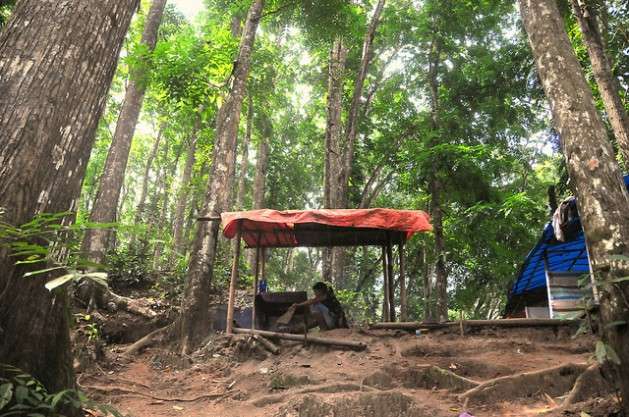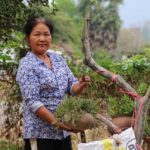BALI, Indonesia, Sep 20 2014 (IPS) – When she talks about the forests in her native Kalimantan, the Indonesian part of the island of Borneo, Maridiana Deren’s facial expression changes. The calm, almost shy person is transformed into an emotionally charged woman, her fists clench and she stares wide-eyed at whoever is listening to her.
“The ‘boohmi’ (earth) is our mother, the forest our air, the water our blood,” says the activist, who has been taking on mining and oil industries operating in her native island for over a decade.
Deren, who counts herself among the Dayak people, works as a nurse and has had numerous run-ins with powerful, organised and rich commercial entities. They have sometimes been violent – she was once stabbed and on another occasion rammed by a motorcycle.
After years of taking on wealthy corporations, Deren is now facing a new opponent, one she finds even harder to tackle – her own government.
“They want to [designate] our forests as conservation areas, and take them away from us,” she tells IPS.
She alleges that under the guise of the scheme known as REDD+ (Reducing Emissions from Deforestation and Forest Degradation), which provides financial incentives for developing countries to cut down on carbon emissions, governments are encroaching on indigenous people’s ancestral lands in remote areas like Kalimantan.
The REDD scheme, which came into effect at the close of the United Nations Framework Convention on Climate Change (UNFCCC) negotiations in Bali, Indonesia in 2007, works by calculating the amount of carbon stored in a particular forest area and issuing ‘carbon credits’ for the preservation or sustainable management of these carbon stocks.
The carbon credits can then be sold to polluting companies in the North wishing to offset their harmful emissions. Now, according to indigenous communities worldwide, the programme has become just another way for interested parties to strip small communities of their ancestral lands.
It is not only in Indonesia that large, multi-national and multi-million-dollar environment conservation efforts are running headlong into the interests of local communities. In the Asia-Pacific region, India and the Philippines are witnessing similar conflicts of interest, a pattern that is repeated on a global scale, according to experts and researchers.
In India, activists claim, successive governments have been trying to use the 1980 Forest Conservation Act to take over forests from indigenous communities for decades.
“Now they can use REDD+ as an added reason to take over forests, it is becoming a major issue where communities that have lived off and taken care of forests for generations are deprived of them,” Michael Mazgaonkar, a member of the Indian advisory board at the U.S.-based Global Greengrants Fund, which specialises in small grants to local communities, told IPS.
In the northern Indian state of Manipur, for instance, the Asian Human Rights Commission reports that forest clearing for the purpose of constructing the Mapithel dam on the Thoubal River in the Ukhrul district has, since 2006, ignored the objections of indigenous communities in the region.
Well-oiled global entities undermining grassroots interests under the guise of ‘development’ is a frequent occurrence, according to Mary Ann Manahan, a programme officer with the think-tank Focus on the Global South in the Philippines.
She takes the example of assistance provided by the Asian Development Bank (ADB) in the aftermath of Typhoon Haiyan that devastated the country in late 2013.
“It was a one-billion-dollar loan, that came with all kinds of conditions attached. It stipulated what kind of companies could be [contracted] with the funding” and how the funds could be spent, she said.
“By doing that, the loan limited how local communities could have benefited from the funds by way of employment and other benefits,” Manahan added.










